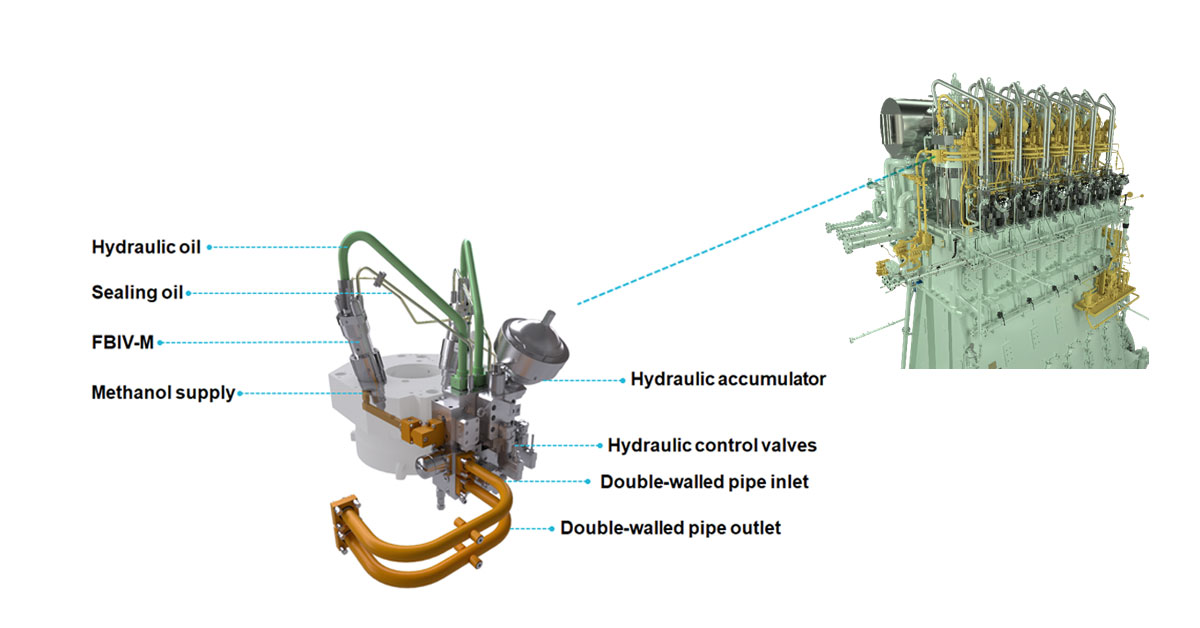Enabling a scalable energy transition
The MAN B&W ME-LGIM two-stroke dual-fuel engine can run on methanol as well as conventional fuels. Specifically designed to meet the needs of the maritime industry, it is a versatile and scalable solution that is suited to a wide range of vessel types. Simple handling, storage, and bunkering of methanol, combined with relatively simple auxiliary systems and the potential to be carbon-neutral, makes it an attractive option for meeting decarbonization targets.
Proven two-stroke methanol engine design
Available either for newbuilds or for upgrading existing conventional fuel vessels, this engine represents a proven, refined engine design based on over 600,000 running hours on methanol alone. Methanol produced from renewable sources is an attractive marine fuel option due to its low carbon intensity. An engine using green methanol can even provide carbon-neutral propulsion.
Key benefits
A new design for efficient methanol combustion
The ME-LGIM engine has inherited well-known components of our standard two-stroke diesel engine, like the ME-GI dual-fuel engine. Beneficial features of the standard MAN B&W two-stroke diesel engine have been retained. This illustration highlights methanol components and pipes that have been added to the cylinder top for methanol combustion.
The use of methanol as fuel type supports cost-effective vessel designs.

Moving together into a sustainable future
Learn more about the MAN B&W ME-LGIM engine
Continue reading
-
MAN B&W ME-LGIMpdf, 504 KB
Related products
Related News
Low-Speed, Dual-Fuel Portfolio Reaches Millennial Milestone
MAN Energy Solutions has announced that its portfolio of two-stroke, dual-fuel engines has passed more than 1,000 units on order or in service. The engines can run on a variety of alternative fuels, including LNG, methanol, ethane and LPG. The company notes that the new mark also comprises part of an even larger milestone of more than 2,500 Tier-III compliant engine orders.
Bjarne Foldager, Senior Vice President and Head of Low-Speed, MAN Energy Solutions, said: “This is yet another, significant milestone for our dual-fuel portfolio that provides the green solutions desired by the marine market. Our low-speed engines offer multiple paths to decarbonisation and we see the increasing adoption of dual-fuel technology as an irreversible trend.”
MAN Energy Solutions’ dual-fuel journey began in 2011 with a full-scale demonstration of an ME-GI (-Gas Injection) engine at its Research Centre Copenhagen, followed by the first engine delivery in 2014. The ME-GI remains the most prominent dual-fuel engine with more than 500 orders. It is the world’s most efficient LNG-fuelled engine and has extremely low levels of methane slip, which make it the industry’s leading dual-fuel engine across vessel types such as container vessels, bulk carriers, tankers and car carriers.
The first engine tests of the ME-LGI (-Liquid Gas Injection) platform began in 2015, followed by the first sea-trial for the ME-LGIM (methanol) engine in 2016. Development of an ethane (ME-GIE) unit followed in 2016 with sea-trials already in 2017. Currently, more than 240 dual-fuel engines have entered service, while an MAN B&W ammonia-fuelled engine is due to be delivered to a shipyard by 2024.
Thomas S. Hansen, Head of Promotion and Customer Support, MAN Energy Solutions, said: “Of the thousand dual-fuel engines on order or in service, these include more than 214 ME-GA engines, testimony to the success of the second-generation Otto-cycle engine for LNG carriers that offer reduced methane-slip emissions. The first ME-GAs have already been delivered to shipyards and the first vessels will enter service in June 2023. In general, our future outlook on dual-fuel contracting per number of vessels expects that 50% of all vessels will be dual-fuel by 2026. Measured in engine power, more than 60% of all ordered engines are expected to be dual-fuel in 2026.”
Peter Quaade, Head of Dual-Fuel Engine Group – Two-Stroke Operations – MAN Energy Solutions, said: “The performance of newly developed engines demands heightened attention upon their market introduction to optimise performance and resolve any technical challenges. Over time, we have identified and resolved issues such that our dual-fuel portfolio is reliable, mature technology that has achieved exceptionally high running-times of more than 95% on alternative fuels. These dual-fuel engines’ seamless switching between fuels, elimination of fuel-slip, and use of the Diesel combustion principle ensures that they easily adapt to whatever fuels the industry may prefer in the future.”
|
Low-Speed, Dual-Fuel MAN B&W Engine Orders |
|
|
ME-GI |
538 |
|
ME-GIE |
37 |
|
ME-LGIM |
72 |
|
ME-LGIP |
139 |
|
ME-GA |
214 |
Documents
-
PR DF Milestones_EN
Contact
Nils Søholt
Trade Press Marine
Group Communications & MarktingMAN Energy SolutionsTeglholmsgade 412450 Copenhagen SVDenmark
nils.soeholt@man-es.com t +45 33 85 26 69Available languages
- DE ·
- EN
Get notified about press releases
Alternative fuels for your two-stroke powered vessel: Ammonia, methanol and methane in focus
Register for our next MAN ExpertTalk on alternative fuels for large merchant marine vessels. We will provide insights into the most promising marine fuels of the expected future fuel mix for two-stroke vessels, namely ammonia, methanol and methane.
Further, we will inform about the latest product developments and applications as well as reasons why these fuels have the potential to offer a straightforward path for the future maritime energy transition.
- Wednesday, April 24, 15:00 – 15:45 (W. Europe Standard Time)
- Thursday, April 25, 10:00 – 10:45 (W. Europe Standard Time)
